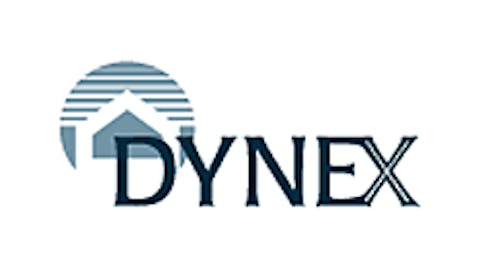Where the death of Fed’s quantitative easing might be a negative for the US equities in general, it will bring relief to the US Agency mortgage REITs sector. I believe in the event of a halt of the Fed’s easing, Annaly Capital Management, Inc. (NYSE:NLY) and American Capital Agency Corp. (NASDAQ:AGNC) will appear to be the largest winners. The rest of this investment thesis aims to look at the reasons for conducting the easing at the first place, reasons for its possible halt and how this halt might lead these stocks to outperform.

The Fed started its $85 billion a month quantitative easing in the wake of a weakening global economy, with the intention of stimulating the US economy, particularly the housing and labor sectors. The easing had more specific objectives, including the continuation until unemployment exceeds 6.5% and so long as inflation isn’t forecast to rise to more than 2.5 percent in one to two years.
Why It Might Halt
However, anxiety over the strategy’s cost and risks is beginning to overshadow it benefits. Recent reports about the lack of durability of the Fed’s program sent S&P sharply lower. The programs’ efficacy, costs, and risk have led a number of participants to say that the FOMC might end its purchases before it could judge a substantial improvement in the outlook for the labor market. The latest release of the minutes of the meeting also reveals a far less unified committee than at any other time in the past few years.
Alternatives To Easing
Among new tools being considered by the Fed’s Open Market Committee’s 19-members is the option of holding on to the bonds for a longer period than originally planned. Currently, the size of Fed’s balance sheet has already crossed $3 billion. This is triple the size of its balance sheet in 2008. The next meeting is scheduled to take place in March this year when a final decision can be expected.
Why A Halt In Easing Will Lead Agency mREITs To Outperform
While the S&P is sent sharply down by the news of a possible halt in the Fed’s easing, one sector in the US will enjoy the death of this easing. This is the US mortgage REITs sector, which suffered the most throughout the easing.
Besides keeping the short term rates at record low, Fed’ QE3 was aimed at bringing down the long-term mortgage rates, in order to make home loans cheap and stimulate the US housing sector. Mortgage REITs, which invest in mortgagebacked securities, earn a yield on those backed securities that is linked to the prevailing mortgage rate. In contrast, the mortgage REITS pay interest on their short-term borrowings, which are used to finance their MBS holdings.
While the record low short-term rates helped these mortgage REITs in bringing their cost of funds, at the same time the downward pressure created by QE3 brought long-term mortgage rates down. Since the yields on MBS held by mortgage REITs are linked to mortgage rates, MBS yields also fell. As a result, the net interest rate spread for many of the Agency mortgage REITs declined many folds over the past few quarters.
Therefore, the death of Fed’s easing would be a sign of relief for Agency mortgage REITs, like American Capital Agency and Annaly Capital Management.
American Capital Agency Corp. (NASDAQ:AGNC)
American Capital Agency invests exclusively in Agency mortgage-backed securities that are fixed-rate in nature. The company has a large concentration of low coupon, HARP eligible loans. These loans are considered to have low prepayment speeds, which is why the management was able to better manage the company during such challenging times without diversifying into assets other than Agency MBS.
The company maintained its quarterly dividend in 2012 and currently yields 15.4%. The stock is up 12.3% since the beginning of the year and is trading at a moderate 3% premium to its book value. American Capital Agency remains one of the very few mortgage REITs which was able to increase its net interest rate spread during the fourth quarter. It reported a net interest rate spread of 1.63%, up 21 basis points sequentially.
At the end of the third quarter, the company reported a net interest rate spread of 1.42%, down 23 basis points sequentially. Similarly, at the end of the second quarter of 2012, the net interest rate spread of 1.65% came down 66 basis points sequentially. This is a combined decline of 68 basis points from the first quarter of 2012. This compression in the net interest rate spread would reverse if the Fed decides to halt its easing.
Annaly Capital Management, Inc. (NYSE:NLY)
Annaly Capital Management is the largest mortgage REIT that invests exclusively in fixed-rate, long-term, high-coupon Agency residential mortgage backed securities with higher loan balances. This is why the company is experiencing high prepayment speeds and is aggressively looking to diversify its MBS portfolio by acquiring CreXus Investments.
The stock is currently trading at 5% discount to its book value and is up 6.4% since the beginning of the year. While it is currently yielding 12%, Annaly was not able to maintain its quarterly dividend during 2012. At the end of the fourth quarter, Annaly Capital posted prepayment speeds of 19% for its portfolio. At the end of the fourth quarter, Annaly Capital posted period-end net interest rate spread of 0.95%, down 7 basis points sequentially. The third quarter end net interest rate spread of 1.02% was down 52 basis points sequentially. A similar 91 basis points decline was experienced at the end of the second quarter of 2012, which brings the total decline to 150 basis points since the first quarter of 2012.
Conclusion
I believe American Capital Agency and Annaly Capital Management are among the mortgage REITs that will benefit the most from a halt in the Fed’s quantitative easing program. A possible halt will reverse the compression in their spreads, resulting in increased dividends. Therefore, investors interested in regular income should keep an eye on the developments regarding the Fed’s March meeting.
The article Potential Winners of Quantitative Easing’s Death originally appeared on Fool.com and is written by Adnan Khan.
Copyright © 1995 – 2013 The Motley Fool, LLC. All rights reserved. The Motley Fool has a disclosure policy.




